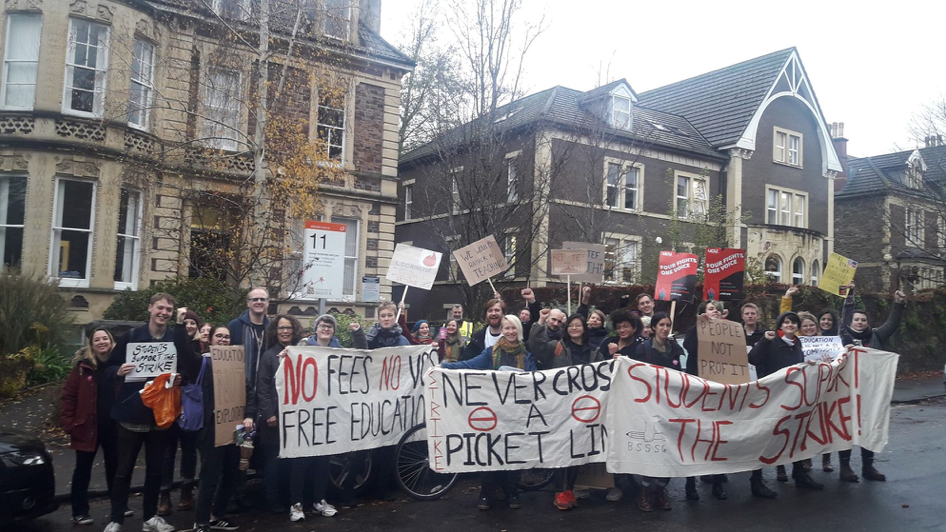By Max Satterly Webley, First Year Chemistry
Once again, university staff across the country have been pushed by universities into striking from 20th February to 13th March. The reasons given by the UCU (University and College Union) are to fight against cuts to pensions, an ever-increasing workload, increasing numbers of zero-hours contracts and an astonishing 21% effective pay cut as wages fail to rise with the rate of inflation, as they have done for the past decade.
This news of further strikes has made many students feel like they are having their voices ignored and are being unfairly subjected to ever more cancelled lectures and seminars, with no replacements being planned or offered, just because strikers want to “whine and picket” - as one student put it in a recent Epigram article. Some have even gone so far as to demand reimbursement for lost classes writing frustrated posts on the popular Facebook page, Bristruths.
Yet, what these quite rightly angry people fail to recognise is that their anger is being directed at the victims of injustice rather than the perpetrators of it and, unless this is realised soon, could lead to a potentially disastrous outcome for the strikers.
Anger is being directed at the victims of injustice
What many making the tuition fee refund demands are possibly unaware of is that the money they would receive would be taken directly out of the pay pot from which the strikers would normally have been paid. For any of you who may not know this, staff do not receive any pay whilst on strike. This happened at King’s College London where the students successfully demanded repayment after the last set of strikes. This sets a bad precedent for universities all over the country that, when met with demands of reimbursement, have seen that they can simply dip into money that should have gone to their own staff.
University Strikes: How did it come to this?
This ends up creating further an attitude of commercialisation of the educational system, which has already progressed to the point where students can find themselves in nearly £55,000 worth of government debt after completing a bachelor’s degree.

However, this is but a foot note compared to the injustices going on within the academic world.
As an example of what some university staff have faced, pensions have been cut from £24,000 to £11,000 in some cases. Staff are still being made to pay more money into their pension scheme, decreasing further the amount of money they take home at the end of the day. This is an abhorrent way for Vice Chancellors to save money so the university can keep up with the unrealistic expectations of permanent exponential financial growth, ignoring any form of decency and humanity.
Opinion | These aren't strikes, they're an imposed sabbatical
That is but the tip of the iceberg of causes of this new wave of strikes. All across the country wage inequality is shockingly high with BME and gender wage gaps reaching up to 20% less than their white male counterparts. A fact which shows that even arguably the most progressive institutions in the world, when it comes to social issues, still lack an equal system of pay for its own staff members. We must have people being paid for their work equally with no discrimination of any sort.
Inequality is shockingly high with BME and gender wage gaps reaching up to 20% less than their white male counterparts
To build on this, the casualisation of work within academia is affecting more and more employers, with an increase in the number of zero-hours contracts giving no guarantee of work or pay during any given week and no stability to a person’s working hours from one week to the next. This is just a plain and simple abuse of power by employers who seek to simply use an employee as a tool to make money; only using them when they see fit. Whilst this may be a way to increase the profit margins of a business, it dehumanises the workforce and does not allow workers to effectively deal with the massive workloads imposed upon them.
This has actually led to some staff complaining of unpaid hours of overtime with the average member of staff doing a full 2 days of unpaid labour while already being on a 35 hours-a-week contract.

In the end this whole situation boils down to one thing, the commercialisation of education - the introduction of universities as a business model rather than a way for a population to achieve academically, live long and prosper. But there is a way to counter this. By staying on the right side of the picket lines (or by joining pickets), raising your voice and showing your solidarity with staff and strikers we can, as a community, put a stop to unfair conditions, damaging pension schemes and wage inequality in our university.
When we are united, we are strongest.
Featured Image: Bristol Student-Staff Solidarity
Do you think it is fair to demand reimbursement?









